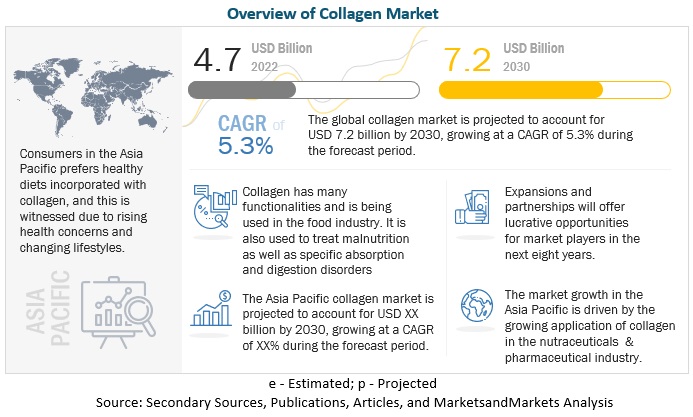
The global collagen market as per revenue was estimated to be worth $4.7 billion in 2022 and is poised to reach $7.2 billion by 2030, growing at a CAGR of 5.3% from 2022 to 2030. The global collagen market is experiencing significant growth due to increasing consumer awareness of the benefits of collagen in various applications such as food and beverages, cosmetics, and pharmaceuticals. Demand for collagen products is also anticipated to rise as gelatin and hydrolyzed collagen is being used in a variety of sectors, including healthcare, cosmetics, and food & beverages. Collagen supplements have a wide range of uses in cosmetic procedures, anti-aging treatments, and aesthetic medications because they keep skin moisturized and keep it from aging.
Download PDF brochure: https://www.marketsandmarkets.com/pdfdownloadNew.asp?id=220005202
Market Drivers and Restraints:
Drivers: Increasing demand for collagen-based cosmetics among the consumers globally
Collagen fibers present in the human skin are damaged with time, losing thickness and strength, which results in skin aging. Collagen is used in the cosmetic industry in creams as a nutritional supplement for bone and cartilage regeneration, vascular and cardiac reconstruction, skin replacement, and augmentation of soft skin, among others. Collagen is a common constituent of soaps, shampoos, facial creams, body lotions, and other cosmetics. Hydrolyzed collagen is an important ingredient in skin and hair care products. One important application of hydrolyzed collagen in the personal care sector is combined with surfactants and active washing agents in shampoos and shower gels. The diet choices people are making nowadays prevent the skin from receiving the vital nutrients it needs. Because of this, nutricosmetics, which give the human skin the nutrition it needs, are very popular. Along with this advantage, the collagen market for nutricosmetics is growing as more individuals are becoming conscious of their own health. For instance, Procter & Gamble (US), under its brand ‘Olay’ has recently announced a launch of a new collection, Olay Regenerist Collagen Peptide 24, which helps to deliver plump and bouncy skin in 2021.
Restraints: Cultural restriction prohibiting consumption of animal-sourced food & beverages
Collagen has varied applications in the food, pharmaceutical, cosmeceutical, and nutraceutical industries. However, they are animal by-products obtained from the slaughtering of animals, including the bones, hides, as well as hooves of cattle, pigs, fish, and poultry. Individuals with religious or dietary restrictions that forbid the consumption of animal products are not willing to consume these products. For instance, pork and pork-derived products are strictly forbidden in Muslim communities (including those in the Middle East). They instead prefer to consume halal-certified bovine-derived products. Therefore, the collagen market for collagen manufactured by pork skin is negligible in these regions. Similarly, in India, the consumption of cattle-derived products is largely culturally forbidden; the Hindu community does not generally consume beef and beef-derived products. Hence, pork-based gelatin and hydrolyzed collagen are mostly consumed in this country. These cultural and regional outlooks can sometimes pose a restraint on the growth of the collagen market.
Collagen Market Analysis:
By source, bovine was the largest source in the global collagen market
By source, bovine was the largest source in the global collagen market. Bovine collagen is extracted from bovine species such as water buffalo, yak, bison, and cows; it is a naturally occurring protein present in the cartilage, connective tissues, bones, and hides of these animals. The collagen present in these animals is similar to the collagen present in human bodies. Bovine collagen is highly rich in type I and III collagen. This type of collagen benefits the nails, skin, tendons, eyes, hair, muscles, bones, and blood vessels. Human skin is mainly made up of type I and III collagen, and hence bovine collagen is especially used in skincare products targeted towards reducing wrinkles, promoting elasticity, and increasing skin moisture.
By product type, gelatin is dominating the global collagen market
By product type, gelatin is the largest market in the global collagen market. Gelatin is a colorless, flavorless, and translucent, brittle food ingredient, which is derived from collagen obtained from various animal body parts. It is obtained not only from animal skin but also from fish and insects. Manufacturing of gelatin includes two methods, which are the alkaline and acid processes, to manufacture type A and type B gelatin, respectively. Gelatin is widely used in foods to improve elasticity, consistency, and stability. Gelatin is used to make gelatinous desserts, gummy candies, many yogurts, and marshmallows. Gelatin is also found as a common ingredient in soups, broths, sauces, marshmallows, cosmetics, and medications. This common thickening and gelling agent are an animal-based product that contains high levels of protein.
Make an Inquiry: https://www.marketsandmarkets.com/Enquiry_Before_BuyingNew.asp?id=220005202
Regional Analysis:
The European region includes Germany, France, the UK, Italy, Spain, and the Rest of Europe. Rising awareness among consumers about the health benefits of collagen has led to the formation of the collagen supplements industry. The region has witnessed many collagen-infused drinks, such as cappuccino collagen and soy collagen, among others, launched by manufacturers. They are either marketed as the components of protein blends or in combination with fruits. The rising usage of collagen in a wide variety of food items & beverages and the changing consumer preference are accelerating market growth. Moreover, the preference for minimally invasive or non-invasive technologies, as well as the increasing use of collagen by biomedical industries in developed countries of Europe, are further fueling the market growth.